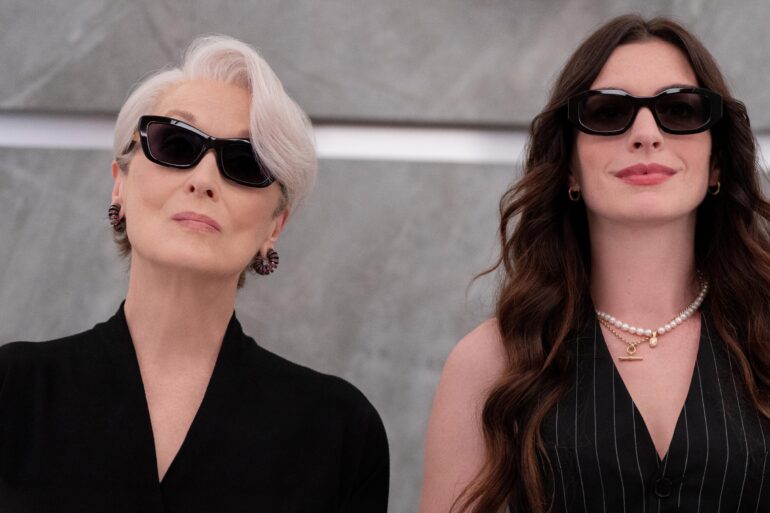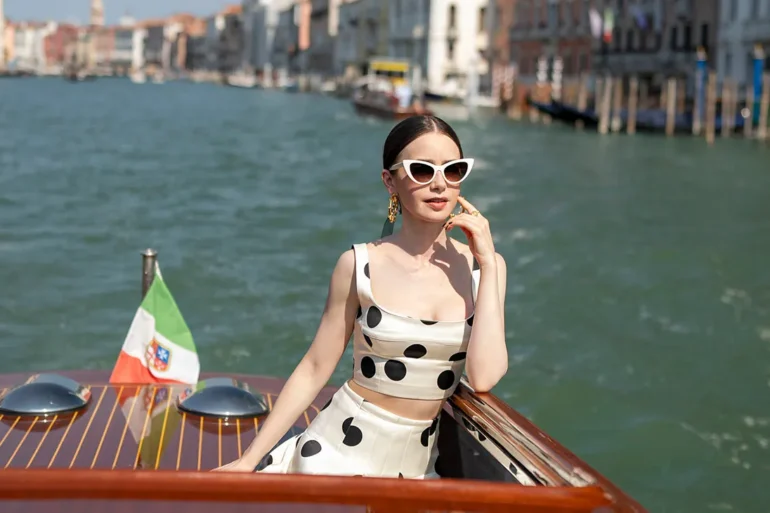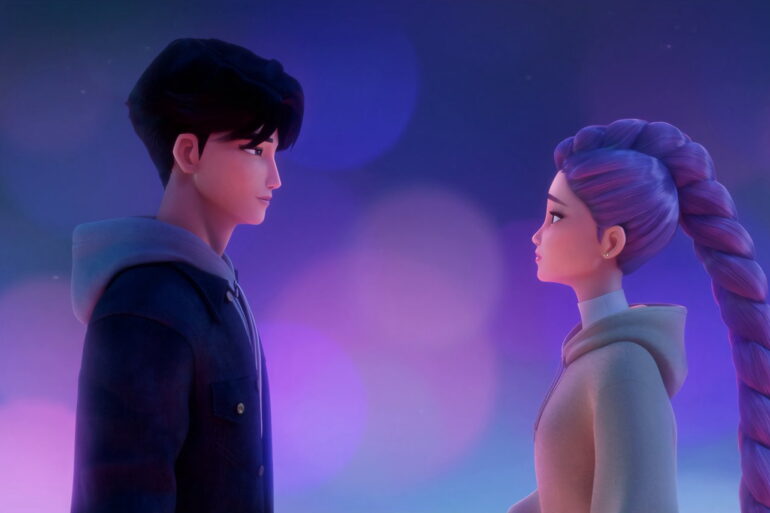The series explores the complicated dynamics of a couples friend group through the different times in their lives.
In the biggest plot twist of the season, Anne (Kerri Kenney-Silver) shakes in front of her microphone and quips, “It’s too complicated to remember him, because on the one hand I had all those good memories with him, and the other I just keep remembering that he left me for someone else.”



The Four Seasons is a miniseries based on the film starring and directed by actor Alan Alda. Just like its predecessor, the series explores the complicated dynamics of a couples friend group—Nick (Steve Carell) and Anne, Danny (Colman Domingo) and Claude (Marco Dalvani), and Jack (Will Forte) and Kate (Tina Fey)—and how they manage to navigate through the different times in their lives. Think Vince Vaughn’s Couples Retreat but filmed through a Gilmore Girls and This Is Us lens—you get the picture. Also, Alda plays a cameo!
Releasing this series on Labor Day weekend was a perfect choice by Netflix, as it gave me the opportunity to enjoy the short episodes snuggled under a comforter. But as the series progressed, I didn’t know I’d be yelling at the television saying, “Why are these comedians making me cry!”
Related story: REVIEW ‘Black Mirror’ Season 7: Tinker, voyeur, soldier, cry
Related story: ‘Wednesday’ Season 2 promises chaos, family drama, and a lot more knives
A character study at its core



“I’m thinking about leaving Anne,” says Nick mid-trek with Danny and Jack. Dumbfounded, his two friends rally the decision with him, saying that it would break Anne’s heart. But honesty came first for Nick, saying that he wants to be with a woman who does not stop trying. Despite being together for twenty-five years, he didn’t want to waste another year being with someone he did not want to wake up to.
The heart of the series is truly the people behind it. It isn’t every day I get to say 30 Rock’s Liz Lemon and The Office’s Michael Scott are undergoing their own midlife crises, and that they actually do material that’s more serious than “I want to go to there” or “That’s what she said!” (Bonus points if you get one or both references). Fey and Carell have previously teamed up before in Date Night, but it’s nice to see that they’ve moved past the shenanigans and actually tackle the other, more tangled aspects of life.
Related story: HBO’s making a ‘Harry Potter’ series—but do we really need it?
Related story: Meet the Fab Four: Here are the actors playing the Beatles in 4 highly anticipated biopics
It is both a risk and reward for the show to explore Nick dating a woman twenty years his junior. “She’s my dental hygienist,” he says of Ginny (Erika Henningsen) in the earlier episodes. And like any normal friend group, they proceed to dissect the relationship and chalk up Nick’s decision to mid-life fright.
But what is refreshing is to see the dynamic fully flesh out, and how the series subverts the dynamic into one of mutual respect, love and “Carl.” “He was actually happy,” Anne admits reluctantly to Ginny. “More than he has ever been.” At the heart of it, Nick wanted to feel forever young coming from a relationship he felt aged him, and maybe that was the mark he wanted to leave.
“You are sunlight and buttered toast,” Nick says to Ginny. Oh, to be called that!
‘He was a butterfly’



“Is that a stripper’s shoe?”
The final episode is a masterpiece in itself. There is even a hilarious presentation of the episode title “fun”– a truly delightful exchange. Fey truly displays her seasoned SNL-raised comedy chops, as do Carell and Forte, with the support of Domingo, Dalvani, and Silver. Nostalgia crept in quick with the 20-minute sitcom-paced episodes, but more than that, the timings are masterful, and I know that only comedians of their caliber can do so.
But even amid dead-pan delivery, the complications of grief, sadness and stifled coupling are illustrated just as well in Danny and Claude’s dynamic—a gender-bent version of the 1981 original. “He was a butterfly,” says Claude to a frustrated Danny.
Like the butterfly’s life cycle, the two gentlemen are encased in their own cocoon. The doting, sometimes overbearing Claude loves the little love nest they were in, but Danny feels otherwise. In the final episode, Danny finally explodes and shares that Claude, while caring, never actually cared about Danny’s feelings. “You want me to feel good and happy, but what about if I just want to feel sad?”
Grief is the poem that Danny and Claude write beautifully, each in their own rhythm, and in the end, they mourn both apart and together. It’s also great to see that Danny admits they need space sometimes, and how having it could do wonders to improve the connection they have.
Anne’s speech in this episode is also not mere babble, but a reluctant admission that despite having known someone for 25 years, it is difficult to realize that maybe she didn’t know her ex at all. Even then, she still did not want to disregard the good memories that came out of that.
‘A beautiful blip’



In the fight to get the microphone, scorned ex-wife Anne lobbies for fresh catch Ginny not to speak for Nick. “I was married to him, he only dated her for a year,” says Anne, comparing their relationship to Nick’s temporary interest in judo. After fixing her emotionally dependent husband Jack’s wrongs, Kate tells Ginny that Anne does not want her to speak, reducing Nick and Ginny’s relationship to “a blip… a beautiful blip.”
But Ginny describes Nick as her soulmate, to which Kate carries that over to Jack after episodes of fighting with him. Jack and Kate’s dynamic is an insight into couples who don’t communicate and instead resort to resentful comments as a way to weasel through their frustrations with each other. It is the most exhausting to see them, but truly a feat for Forte, whom I remember starkly as both MacGruber and Randy Wharmpess in How I Met Your Mother (his nose bleeds profusely at the first sign of attraction in HIMYM).
Fey beautifully portrays the wife who has to do it all, the one who adapts the masculine energy because she sees her paramour as helpless. On the other hand, Forte displays the misunderstood husband, who only wants to play good cop to avoid complications. But a final trust exercise closes out their frustrations with one another, and pulls their relationship out of thin ice (literally).
Finally, giving a voice to Ginny, the outlier of the group, is also a splendid decision. Her meltdown in the end is masterfully done, and the last-ditch effort to take the group mind out into the open. It is a performance worth remembering, and one that made me tear up the most.
Overall, it’s a wonderful return for most of these players on the small screen—and it took all of my strength (and several sentences later) to appreciate Carell in his silver-fox era. But just like what they say, “Seasons change, but the love remains.”
The Four Seasons is now streaming on Netflix.
Related story: REVIEW: Equal parts witty and earnest, ‘A Real Pain’ is a real treat
Related story: REVIEW: Latvian film ‘Flow’ is a breath of fresh air in the world of animation








